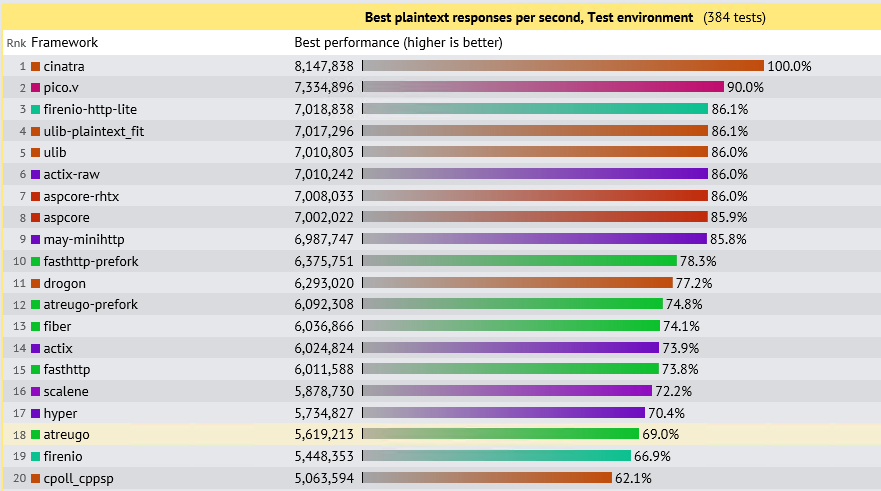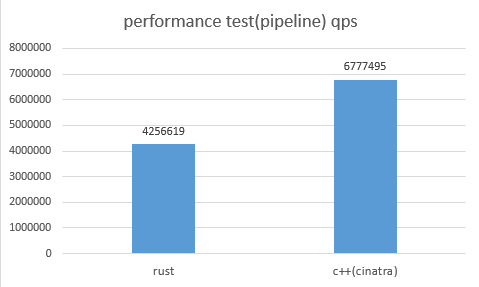cinatra--一个高效易用的c++ http框架
English | 中文
目录
cinatra简介
cinatra是一个高性能易用的http框架,它是用modern c++(c++17)开发的,它的目标是提供一个快速开发的c++ http框架。它的主要特点如下:
- 统一而简单的接口
- header-only
- 跨平台
- 高效
- 支持面向切面编程
cinatra目前支持了http1.1/1.0, ssl和websocket, 你可以用它轻易地开发一个http服务器,比如常见的数据库访问服务器、文件上传下载服务器、实时消息推送服务器,你也可以基于cinatra开发一个mqtt服务器。 cinatra是世界上性能最好的http服务器之一,性能测试详见性能测试
谁在用cinatra
cinatra目前被很多公司在使用,在这里可以看到谁在用cinatra.
如何使用
编译依赖
cinatra是基于boost.asio开发的,所以需要boost库。不过,cinatra同时也支持了ASIO_STANDALONE,你不必一定需要boost库。
cinatra需要的依赖项:
- C++17 编译器 (gcc 7.2, clang 4.0, Visual Studio 2017 update 15.5,或者更高的版本)
- Boost.Asio(或者独立的 Asio)
- Boost.System
- UUID 库 (Windows: objbase.h , Linux: uuid.h, Mac: CFUUID.h)
使用
cinatra是header-only的,直接引用头文件既可。
快速示例
示例1:一个简单的hello world
#include "cinatra.hpp"
using namespace cinatra;
int main() {
int max_thread_num = std::thread::hardware_concurrency();
http_server server(max_thread_num);
server.listen("0.0.0.0", "8080");
server.set_http_handler<GET, POST>("/", [](request& req, response& res) {
res.set_status_and_content(status_type::ok, "hello world");
});
server.run();
return 0;
}
5行代码就可以实现一个简单http服务器了,用户不需要关注多少细节,直接写业务逻辑就行了。
示例2:展示如何取header和query以及错误返回
#include "cinatra.hpp"
using namespace cinatra;
int main() {
http_server server(std::thread::hardware_concurrency());
server.listen("0.0.0.0", "8080");
server.set_http_handler<GET, POST>("/test", [](request& req, response& res) {
auto name = req.get_header_value("name");
if (name.empty()) {
res.set_status_and_content(status_type::bad_request, "no name");
return;
}
auto id = req.get_query_value("id");
if (id.empty()) {
res.set_status_and_content(status_type::bad_request);
return;
}
res.set_status_and_content(status_type::ok, "hello world");
});
server.run();
return 0;
}
示例3:面向切面的http服务器
#include "cinatra.hpp"
using namespace cinatra;
//日志切面
struct log_t
{
bool before(request& req, response& res) {
std::cout << "before log" << std::endl;
return true;
}
bool after(request& req, response& res) {
std::cout << "after log" << std::endl;
return true;
}
};
//校验的切面
struct check {
bool before(request& req, response& res) {
std::cout << "before check" << std::endl;
if (req.get_header_value("name").empty()) {
res.set_status_and_content(status_type::bad_request);
return false;
}
return true;
}
bool after(request& req, response& res) {
std::cout << "after check" << std::endl;
return true;
}
};
int main() {
http_server server(std::thread::hardware_concurrency());
server.listen("0.0.0.0", "8080");
server.set_http_handler<GET, POST>("/aspect", [](request& req, response& res) {
res.set_status_and_content(status_type::ok, "hello world");
}, check{}, log_t{});
server.run();
return 0;
}
本例中有两个切面,一个校验http请求的切面,一个是日志切面,这个切面用户可以根据需求任意增加。本例会先检查http请求的合法性,如果不合法就会返回bad request,合法就会进入下一个切面,即日志切面,日志切面会打印出一个before表示进入业务逻辑之前的处理,业务逻辑完成之后会打印after表示业务逻辑结束之后的处理。
示例4:文件上传
cinatra目前支持了multipart和octet-stream格式的上传。
multipart文件上传
#include <atomic>
#include "cinatra.hpp"
using namespace cinatra;
int main() {
http_server server(std::thread::hardware_concurrency());
server.listen("0.0.0.0", "8080");
//http upload(multipart)
server.set_http_handler<GET, POST>("/upload_multipart", [](request& req, response& res) {
assert(req.get_content_type() == content_type::multipart);
auto& files = req.get_upload_files();
for (auto& file : files) {
std::cout << file.get_file_path() << " " << file.get_file_size() << std::endl;
}
res.set_status_and_content(status_type::ok, "multipart finished");
});
server.run();
return 0;
}
短短几行代码就可以实现一个http文件上传的服务器了,包含了异常处理和错误处理。
octet-stream文件上传
#include <atomic>
#include "cinatra.hpp"
using namespace cinatra;
int main() {
http_server server(std::thread::hardware_concurrency());
server.listen("0.0.0.0", "8080");
//http upload(octet-stream)
server.set_http_handler<GET, POST>("/upload_octet_stream", [](request& req, response& res) {
assert(req.get_content_type() == content_type::octet_stream);
auto& files = req.get_upload_files();
for (auto& file : files) {
std::cout << file.get_file_path() << " " << file.get_file_size() << std::endl;
}
res.set_status_and_content(status_type::ok, "octet-stream finished");
});
server.run();
return 0;
}
示例5:文件下载
//chunked download
//http://127.0.0.1:8080/assets/show.jpg
//cinatra will send you the file, if the file is big file(more than 5M) the file will be downloaded by chunked. support continues download
示例6:websocket
#include "cinatra.hpp"
using namespace cinatra;
int main() {
http_server server(std::thread::hardware_concurrency());
server.listen("0.0.0.0", "8080");
//web socket
server.set_http_handler<GET, POST>("/ws", [](request& req, response& res) {
assert(req.get_content_type() == content_type::websocket);
req.on(ws_open, [](request& req){
std::cout << "websocket start" << std::endl;
});
req.on(ws_message, [](request& req) {
auto part_data = req.get_part_data();
//echo
std::string str = std::string(part_data.data(), part_data.length());
req.get_conn()->send_ws_string(std::move(str));
std::cout << part_data.data() << std::endl;
});
req.on(ws_error, [](request& req) {
std::cout << "websocket pack error or network error" << std::endl;
});
});
server.run();
return 0;
}
示例7:io_service_inplace
本代码演示如何使用io_service_inplace,然后自己控制http server的运行线程以及循环。 使用 [http://[::1]:8080/close] (IPv6) 或者 [http://127.0.0.1:8080/close] (IPv4) 来关闭http server。
#include "cinatra.hpp"
using namespace cinatra;
int main() {
bool is_running = true;
http_server_<io_service_inplace> server;
server.listen("8080");
server.set_http_handler<GET, POST>("/", [](request& req, response& res) {
res.set_status_and_content(status_type::ok, "hello world");
});
server.set_http_handler<GET, POST>("/close", [&](request& req, response& res) {
res.set_status_and_content(status_type::ok, "will close");
is_running = false;
server.stop();
});
while(is_running)
server.poll_one();
return 0;
}
cinatra客户端使用
发get/post消息
auto client = cinatra::client_factory::instance().new_client("127.0.0.1", "8080");
client->send_msg("/string", "hello"); //post json, default timeout is 3000ms
client->send_msg<TEXT>("/string", "hello"); //post string, default timeout is 3000ms
client->send_msg<TEXT, 2000>("/string", "hello"); //post string, timeout is 2000ms
client->send_msg<TEXT, 3000, GET>("/string", "hello"); //get string, timeout is 3000ms
文件上传
异步文件上传接口,只需要提供文件名即可。目前的接口只支持单个文件的上传,后续会支持多文件的上传。 注意:在client文件上传结束之前不要重新上传文件。
auto client = cinatra::client_factory::instance().new_client("127.0.0.1", "8080");
client->on_progress([](std::string progress) {
std::cout << progress << "\n";
});
client->upload_file("/upload_multipart", filename, [](auto ec) {
if (ec) {
std::cout << "upload failed, reason: "<<ec.message();
}
else {
std::cout << "upload successful\n";
}
});
如果要支持多文件上传,可以通过遍历方式上传:
for (auto& filename : v) {
auto client = cinatra::client_factory::instance().new_client("127.0.0.1", "8080");
client->on_progress([](std::string progress) {
std::cout << progress << "\n";
});
client->upload_file("/upload_multipart", filename, [](auto ec) {
if (ec) {
std::cout << "upload failed, reason: "<<ec.message();
}
else {
std::cout << "upload successful\n";
}
});
}
文件下载
auto client = cinatra::client_factory::instance().new_client("127.0.0.1", "8080");
auto s = "/public/static/test1.png";
auto filename = std::filesystem::path(s).filename().string();
client->download_file("temp", filename, s, [](auto ec) {
if (ec) {
std::cout << ec.message() << "\n";
}
else {
std::cout << "ok\n";
}
});
先建立连接,输入ip("127.0.0.1", "8080")或域名("purecpp.org", "http"); downlad_file接口第一个参数是下载目录,这个参数可以不填,如果不填则下载到当前目录; 第二个参数是需要保存的文件名; 第三个参数是静态资源的路径,注意要带上斜杠; 第四个参数是下载的回调,如果没有错误就表示下载完成,否则为下载出错;
设置下载的用户回调
client->on_length([](size_t length){
std::cout<<"recieved data length: "<<length<<"\n";
});
client->on_data([](std::string_view data){
std::cout<<"recieved data: "<<data<<"\n";
});
on_length回调下载的数据的长度; on_data回调下下载的数据,注意,如果设置了on_data,cinatra将不会去将下载的数据存到文件中,而是完全交给用户去处理;如果没有设置该回调则会默认存文件。
boost::asio::ssl::context ctx(boost::asio::ssl::context::sslv23);
ctx.set_default_verify_paths();
auto client = cinatra::client_factory::instance().new_client("127.0.0.1", "https", ctx);
client->on_length([](size_t _length) {
std::cout << "download file: on_length: " << _length << std::endl;
});
client->download_file("test.jpg", "/public/static/test.jpg", [](boost::system::error_code ec) {
std::cout << "download file: on_complete: " << (!ec ? "true - " : "false - ") << (ec ? ec.message() : "") << std::endl;
});
std::string ss;
std::cin >> ss;
性能测试
测试用例:
注意事项
websocket的业务函数是会多次进入的,因此写业务逻辑的时候需要注意,推荐按照示例中的方式去做。
cinatra目前刚开始在生产环境中使用, 还处于开发完善阶段,可能还有一些bug,因此不建议现阶段直接用于生产环境,建议先在测试环境下试用。
试用没问题了再在生产环境中使用,试用过程中发现了问题请及时提issue反馈或者邮件联系我。
测试和使用稳定之后cinatra会发布正式版。
roadmap
- 增加一个基本的client用于server之间的通信
我希望有越来越多的人使用cinatra并喜欢它,也希望cinatra在使用过程中越来越完善,变成一个强大易用、快速开发的http框架,欢迎大家积极参与cinatra项目,可以提issue也可以发邮件提建议,也可以提pr,形式不限。
这次重构的cinatra几乎是重写了一遍,代码比之前的少了30%以上,接口统一了,http和业务分离,具备更好的扩展性和可维护性。
联系方式
qq群:340713904

